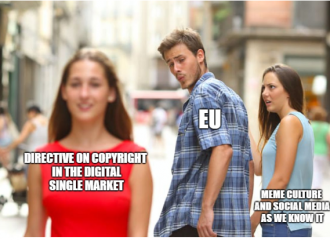Earlier last month the European Parliament voted in favour of the EU Copyright Directive (known more formally as ‘Directive on Copyright in the Digital Single Market’), proposed legislation designed to better meet the needs of copyright protection in the Internet age.
The directive is an attempt at amending the imbalances between the large digital corporations and the content creators who use these platforms to share their work. The aim is to implement a more rigorous process for protecting works against copyright infringement, while also providing a more efficient way to distribute earnings to rightsholders and reduce the ‘value gap’ between creatives and the big players in the tech world.
With piracy and the misuse of copyright being one of the ubiquitous consequences of the digital era, updating copyright protection laws would be something to get behind and celebrate, right?
Well…
While those in the creative industries, such as publishers, music labels, and individual creatives have thrown their support behind the Directive, many others, especially those in Silicon Valley, are rallying in strong opposition of the proposed laws; extreme opposers even heralding the “death of the Internet” as we know it.
Two specific articles of the directive find themselves at the heart of the polarising debate, namely, Articles 11 and 13.
Article 11
Article 11, aptly nicknamed ‘the Link Tax’, is designed to allow publishers of news content to request online platforms and news aggregators to obtain licences before they are able to share any of their publications. The obvious players finding themselves in the cross-hairs of this article are the larger platforms such as Google and Facebook. However, while individual and non-commercial use has been exempted from the law, there is concern the article will have broader implications, especially on smaller websites who wish to publish snippets and links to articles and who may be unable to afford the required fees.

Will this be the end of the Internet as we know it?
Article 13
Article 13, dubbed the “upload filter”, is the more controversial of the two.
The article is aimed at holding platforms that host user-generated content (such as YouTube) liable for any misuse of copyright that may result from any material uploaded by their users. Essentially, it means these platforms can be sued directly by rightsholders for infringement.
While the current method of policing the misuse of copyright is by responding to complaints by rightsholders, and removing any infringing content accordingly, the directive will require these platforms to take “effective and proportionate” measures to prevent unauthorised works from being uploaded.
“But YouTube has over 300 hours’ worth of video content uploaded every hour. How could they possibly find and stop all the infringing content from being uploaded?” you ask. It is exactly this practicality of complying with Article 13 that has proved one of the more contentious points of the debate.
It is argued that the only possible way to implement this process of prevention is by using automatic filtering technology capable of scanning through every single piece of content and stopping any content it recognises as copyrighted material in its tracks. Easy enough, right?
While it might not be a significant burden for the giants of the tech world, like Google, YouTube, and Facebook, who have the finances to develop and implement such technologies, its effect on smaller platforms appears to be more problematic; with some contending it will hinder the growth of digital platforms in the EU which will be unable to cope with the article’s requirements.
Just as concerning is just how efficient such filtering technology can be. It has been queried how the technology will be able to recognise and distinguish copyright infringement from other authorised or legal uses of copyright, such as parody or satire. This worry has given the article another common nickname: the “Meme Ban.”
For those not familiar, memes are often created by using still images (commonly taken from copyrighted works such as photographs, films, or television shows) and layering text over the top for comedic effect or expression of an idea. While they are most often created without the author’s consent for use of an image, they are still currently considered legal under EU law. Accordingly, there are serious concerns that if the filtering technology required by Article 13 is unable to distinguish legal use from infringement, content such as memes will mistakenly be flagged as infringement.
So, while memes may not be technically banned as the nickname suggests, they may likely still be flagged and killed off amongst the other infringing uploaded content.
What happens next?
The proposed legislation still faces one more round of voting in January 2019 before it will receive final approval. Many believe that, after the successful vote last month, it is very unlikely the legislation will be defeated in the new year.
What remains to be seen is in fact, however, is just much of a disruptive impact the directive will have on the Internet both in the EU and around the world.
Author: Blake Motbey, Paralegal.
